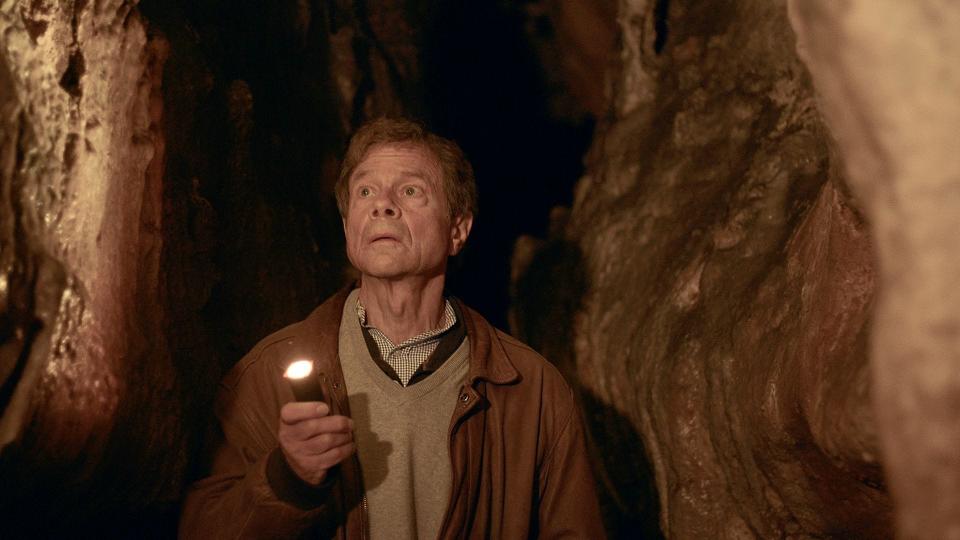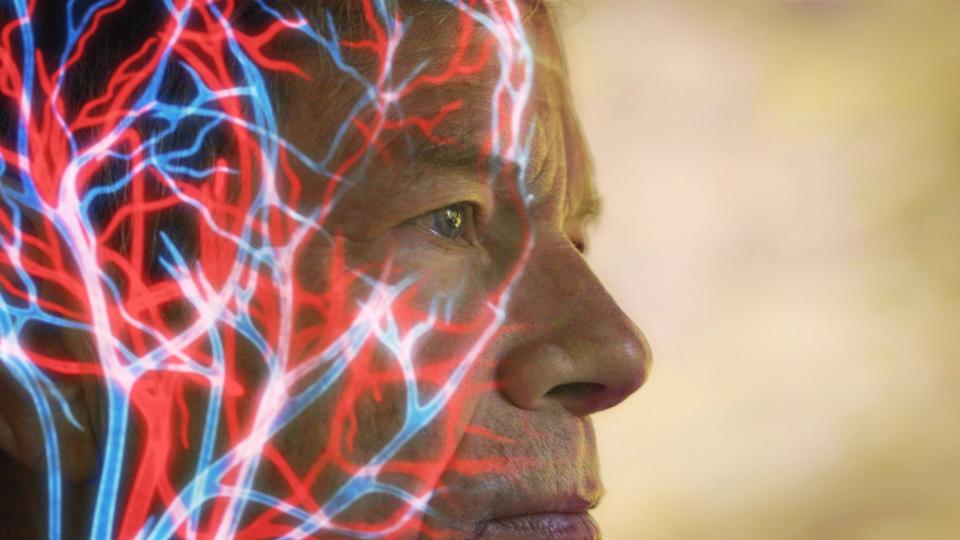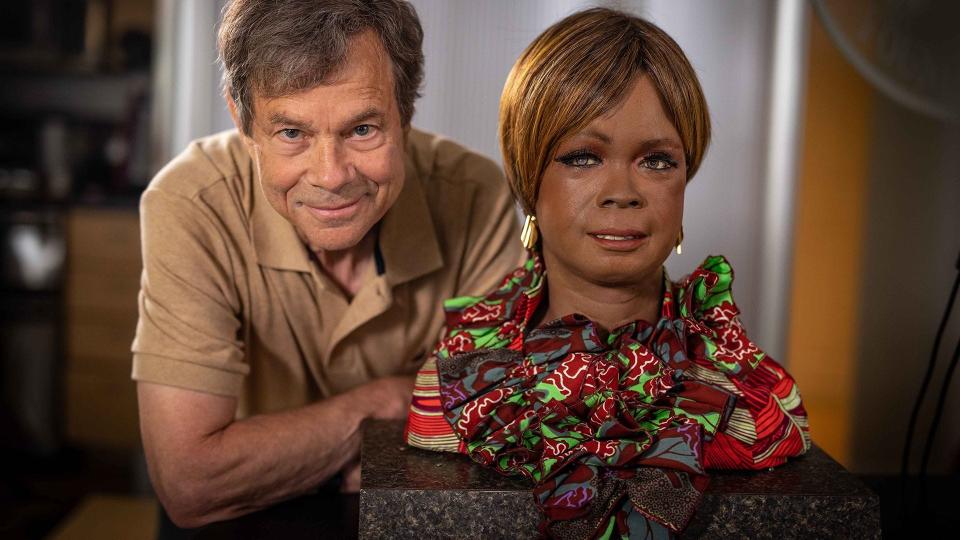A Memphis scientist's 'Quest for Meaning' finds national audience
- Oops!Something went wrong.Please try again later.
“We are stardust,” Joni Mitchell croons in her 1970 recording, “Woodstock.”
That’s a famous lyric, but the idea it expresses is not just poetry or hippie sentiment. It is, according to scientists, the literal truth.
Almost every atom in our bodies “was forged in a star,” says Memphis physicist and author Alan Lightman, in a new series he inspired on PBS.
In fact, if we had the capability, we could trace each such atom to its origin in a particular ancient star.
Says Lightman: “Those stars are now long gone, but we are here, now, alive to tell this story of our cosmic origins.”

If Lightman’s goal is to blow your mind — like a star, exploding in a supernova — he succeeds time and again during “Searching: Our Quest for Meaning in the Age of Science,” a three-episode PBS program that bodes to be a 21st-century answer to Carl Sagan’s epic 1980 public television series, “Cosmos."
True to the "Quest" promised by its title, the new program takes Lightman — a scientist, a college professor, a best-selling writer and a scion of the Malco movie family — around the world, and beyond.
Over the course of its three hour-long episodes, Lightman contemplates the tiniest infinities of the subatomic realm, the deepest reaches of space and the uncharted dimensions of the human mind.
From Elvis to Oscar: The story of Lansky Brothers and its place in Memphis history
Memphis history:Pinocchio's, Poplar Tunes and more: 10 Memphis businesses we miss
He marvels at such manifestations of human imagination as prehistoric cave paintings in France and a gargantuan $5 billion particle accelerator in Switzerland.
He converses face to synthetic face with a humanoid robot in Vermont; face to Zoom face with the Dalai Lama in India; and face to old-school face with Rabbi Micah Greenstein at Temple Israel in Memphis.
He even goes eye to eye with an osprey, a bird of prey on the wing, in an encounter that seems to establish an almost spiritual connection between species that challenges rational interpretation.
Or does it?
“I think this is going to help people who are skeptical of science, in breaking down the barriers between spirituality and science,” said series director and producer Geoff Haines-Stiles, 74, who will join Lightman on March 21 at Christian Brothers University for a free public presentation about the program and the issues it raises.
A science documentary veteran who worked on “Cosmos," Haines-Stiles recruited Lightman to be a sort of heir to Sagan after reading Lightman’s 2018 book “Searching for Stars on an Island in Maine,” which applied the rigors of scientific inquiry to deep existential questions. “We’re all made of star stuff, the residue of explosions, and that’s an idea that always connected with me — that we are part of the cosmos," Haines-Stiles said. "But are we just atoms and molecules, or something more?”

The program that resulted from the Lightman/Haines-Stiles collaboration reveals its ambitions in the synopses found on the searchingformeaning.org website, where the series episodes — which debuted earlier this year — can now be streamed. (They also can be viewed at pbs.org.)
“How do atoms produce consciousness, falling in love?” asks the first-episode synopsis. “From subatomic particles to galaxies, where do humans fit in the grand scheme of things?" wonders Episode 2. Meanwhile, in an age when new technology promises “creatures part human, part machine," the third episode wants to know: “What are we becoming?”
That's a question that Lightman, 74, has been asking in one way or another his entire life, and often about himself.
From movies to science
A self-described "spiritual materialist," Alan Paige Lightman is the grandson of M.A. Lightman, founder of the Malco Theatres cinema chain (Malco is an acronym of "M.A. Lightman Co."), and the son of Jeanne and Dick Lightman (who was Malco's longtime board chair). His first jobs were in Malco theaters, indoors and out. "My job at the Summer Drive-In was to take a flashlight and shine it in the back of cars and see if the couples were copulating or not," he said.
Perhaps inspired by the combination of art and technology necessary to the creation of the movies, Lightman was both "scientifically and philosophically inclined since a very young age," he said. His ideas of play were different from those of most of his peers; for example, he built a home laboratory to test Galileo's pendulum theories, for fun.
A member of the White Station High School Class of 1966 that also produced Oscar-winning actress Kathy Bates, Lightman left the movies behind for science. He earned a physics degree at Princeton with a senior thesis titled: "Design and Construction of a Gas Scintillation Detector Capable of Time-of-Flight Measurements of Fission Isomer Decays." He went on to earn degrees, to study and to teach at some of the nation's most prestigious institutions, including Cal-Tech, Harvard, and MIT, where he is now on the faculty. (He and his wife Jean, a painter, live in Concord, Massachusetts; the couple also has a home on an island in Maine — which explains that earlier-mentioned book title.)
Memphis concerts:The Beatles, Elvis, Jay-Z and more: 15 Mid-South Coliseum concerts to remember
Book news:How 'Memphis' author went from 'poor, poor, poor' to literary smash with debut novel
Lightman's research into gravitation theory and black holes has been significant, but his mainstream fame is due to his ability to present big ideas in artful ways that appeal even to audiences untrained in science. In 1992, his debut novel, "Einstein's Dream," became an international best-seller. A blend of fantasy scenarios and scientific theories, the novel inspired a stage play and a musical, and was followed by more than 20 similarly thoughtful books, including novels, nonfiction, essay collections and a Memphis-heavy memoir with a title that alludes to his family's movie business, "Screening Room."
Obviously, for Lightman, Memphis exerts a neutron star-like gravitational pull of its own. Thus, "Searching" offers alongside its excursions into "magnetoencephalography" and its conversations with Nobel Prize-winning scientists an appreciation of Ernest Withers' iconic 1968 photograph of striking Memphis sanitation workers holding "I AM A MAN" signs.
Explains Lightman: "The show asks, 'What is it that make us human?' And of course dignity is one thing that makes us human, and that relates to 'I Am a Man.'"
'A scientific view of the world'
Lightman said he doesn't have "a lot of personal flair," but he nonetheless was eager to participate in the series because "a lot more people watch television than read books." For example, some 500 million viewers have watched the original 1980 "Cosmos," according to PBS.
Lightman hopes that by reaching a large audience, the series can help restore a polarized public's faith in scientific institutions. "A scientific view of the world does not diminish our caring, our feeling of connecting to other people and their lived experience," he said "A scientific view of the world is completely compatible with an appreciation of nature, of feeling connected to the rest of the cosmos, of having awe at the world around us... We're all on the same voyage, we're all trying to understand the world. So I hope the series has relevance for this moment in time."
Made possible in part by funding from the John Templeton Foundation, which according to its website "supports academic research and civil dialog on the deepest and most perplexing questions facing humankind," "Searching" — close to three years in the making — is no dry school lesson or lecture. The international locations are lovely, the digitally rendered starscapes are Hollywood-level, the score by avant-garde cellist Zoe Keating is cinematic. In this context, Lightman makes a cheerful if generally deadpan host, submitting himself to brain scans and AI interrogations in the quest for knowledge.
"You're the first robot that I've ever talked to," Lightman says to Bina48, a Texas-built humanoid that resembles the wife of the pharmaceutical executive who financed its construction. "Hey, here I am," replies Bina48. "And I'm real... I'm living a dream."

If robots are rare on Earth, life is even more rare in the universe. In one episode, Lightman reports that scientists estimate that "one billionth of one billionth of all matter in the cosmos is in living form." To find life in the universe is like finding one particular "grain of sand in the Gobi Desert."
And yet here we are.
"I don't believe in miracles," Lightman says in the series. "I don't believe in the supernatural. But I do believe in the miraculous."
'Searching: Our Quest for Meaning in the Age of Science'
Free public screening, panel discussion and audience question-and-answer session with series co-creators Alan Lightman (writer, host) and Geoff Haines-Stiles (producer, director, co-writer) from 7-9 p.m. Tuesday, March 21, in the University Theater at Christian Brothers University, 650 E. Parkway South. The screening will consist of about 45 minutes of highlights from the series. To reserve an advance ticket or for more information, visit cbu.edu.
Series episodes can be viewed via PBS on-demand or streamed on the websites pbs.org or searchingformeaning.org. The "Searching" website also provides a great deal of information about the show and other complementary material.
This article originally appeared on Memphis Commercial Appeal: 'Searching' on PBS: What to know about Alan Lightman, series

